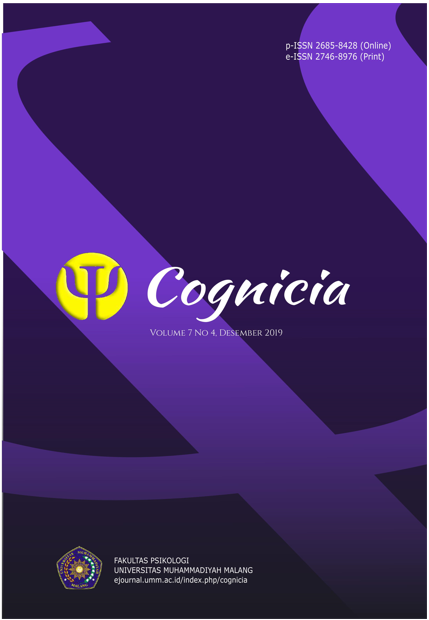Identifikasi kekuatan karakter pada orang tua anak berkebutuhan khusus
DOI:
https://doi.org/10.22219/cognicia.v7i4.10490Keywords:
Kehadiran seorang anak yang merupakan harapan bagi orang tua. Harapan orang tua memiliki anak yang terlahir normal, sehat fisik maupun psikis. Akan tetapi, tidak semua anak lahir dengan sempurna sesuai harapan orang tua. tujuan dari penelitian ini adalahAbstract
Kehadiran seorang anak yang merupakan harapan bagi orang tua. Harapan orang tua memiliki anak yang terlahir normal, sehat fisik maupun psikis. Akan tetapi, tidak semua anak lahir dengan sempurna sesuai harapan orang tua. tujuan dari penelitian ini adalah untuk mengkaji tingkat kekuatan karakter yang dimiliki oleh orang tua dengan anak berkebutuhan khusus. Metode yang digunakan dalam penelitian ini adalah metode kuantitatif deskriptif. Adapun alat ukur yang digunakan adalah skala values in action theory. dari ke 24 character strength atau kekuatan karakter yang diteliti, Berdasar hasil penelitian terhadap seratus orangtua, terdapat 5 aspek yang memiliki total nilai tertinggi dibandingkan dengan karakter lainnya. 5 aspek tersebut diantaranya adalah spirituality (kerohanian), gratitude (rasa bersyukur), hopefulness (harapan), forgiveness (rasa untuk memaafkan),dan curiosity (rasa keingintahuan).
Downloads
References
Diener, E., Lucas, R. E., & Oishi, S. (2005). Subjective well-being: The science of happiness and life satisfaction. In C. R. Snyder & S. J. Lopez (Eds.), Handbook of positive psychology (2nd ed.), New York, NY: Oxford University Press
Duckworth, A. L., Steen, T. A., & Seligman, M. E. P. (2005). Positive psychology in clinical
Kashdan, T.B., Uswatte,G. & Julian, T. (2006). Gratitude and hedonic and eudaimonic well-being in Vietnam War veterans. Behaviour Research and Therapy. 44, 177 – 199.
Larsen, J.T & McKibban. A. R. (2008). Is happiness having what you want, wanting what you have, or both?. Psychological Science. 19 (4), 371-377.
Manuel D dan Rhoda Myerson Fondation (1999). Dallas. Umited States of America.
McCullough, M. E., Tsang, J. & Emmons, R.A. (2004). gratitude in intermediate affective terrain: Links of grateful moods to individual differences and daily emotional experience. Journal of Personality and Social Psychology. 86, (2), 295–309.
Meyer, P. S., Johnson, D. P., Parks, A., Iwanski, C. & Penn, D. L. (2012). Positive living: A pilot study of group positive psychotherapy for people with schizophrenia. The Journal of Positive Psychology. 1, 1 – 10.
Mutrofin, S.H. (2006). Pengantar metode riset evaluasi. LaksBang PressIndo. Yogyakarta.
Park, C. L. & Blumberg, C. J. (2002) Disclosing trauma through writing: testing the meaning-making hypothesis. Cognitive Therapy and Research. 26, 597– 616.
Park. N., Peterson, C. & Seligman, M. (2006). Streng of character and well-being. Journal of Social and Clinical Psychology. 23 (5),603 – 619.
Peterson, C. Ruch, W., Beermann, U. Park, N & Seligman, M. E. P. (2007). Strength of character, orientation to happiness and life satisfaction. The journal of positive psychology. 2 (3), 149 – 156.
Rashid, T. (2008) Positive psychotherapy. In Lopez SJ (ed.) Positive Psychology: Exploring the best in people. Vol.4. Westport, C.T. Praeger Publishers.
Seligman, M. E. P. (2002). Authentic happiness: Using the new positive psychology to realize your potential for lasting fulfillment. New York.
Seligman, M. E. P., Steen, T. A., Park, N., & Peterson, C. (2005). Positive psychology progress: Empirical validation of interventions. American Psychologist. 60, 410 - 421
Seligman, M. E. P., Rashid, T., & Parks, A. C. (2006). Positive psychotherapy. American Psychologist. 61, 774 –788.
Snyder, S. R & Lopez, S. J. (2005). Handbook of Positive Psychology. Oxford University Press.
Wood, A. M., Froh, J.J & Geraghty, A.W.A. (2010). Gratitude and well-being: A review and theoretical integration. Clinical Psychology Review. 30, 890-905
Zulfiana, U (2012), Psikoterapi Positif untuk Meningkatkan Kebahagiaan Lansia di Panti Wreda. Jurnal Sains dan Praktik Psikologi. Vol 2 (3). 256-267.
Downloads
Published
How to Cite
Issue
Section
License
Copyright (c) 2019 Uun Zulfiana

This work is licensed under a Creative Commons Attribution-ShareAlike 4.0 International License.
Authors who publish with Jurnal Cognicia agree to the following terms:
- For all articles published in Jurnal Cognicia, copyright is retained by the authors. Authors give permission to the publisher to announce the work with conditions. When the manuscript is accepted for publication, the authors agree to automatic transfer of the publishing right to the publisher.
- Authors retain copyright and grant the journal right of first publication with the work simultaneously licensed under a Creative Commons Attribution-ShareAlike 4.0 International License that allows others to share the work with an acknowledgment of the work's authorship and initial publication in this journal.
- Authors are able to enter into separate, additional contractual arrangements for the non-exclusive distribution of the journal's published version of the work (e.g., post it to an institutional repository or publish it in a book), with an acknowledgment of its initial publication in this journal.
- Authors are permitted and encouraged to post their work online (e.g., in institutional repositories or on their website) prior to and during the submission process, as it can lead to productive exchanges, as well as earlier and greater citation of published wor (See The Effect of Open Access).

This work is licensed under a Creative Commons Attribution-ShareAlike 4.0 International License







